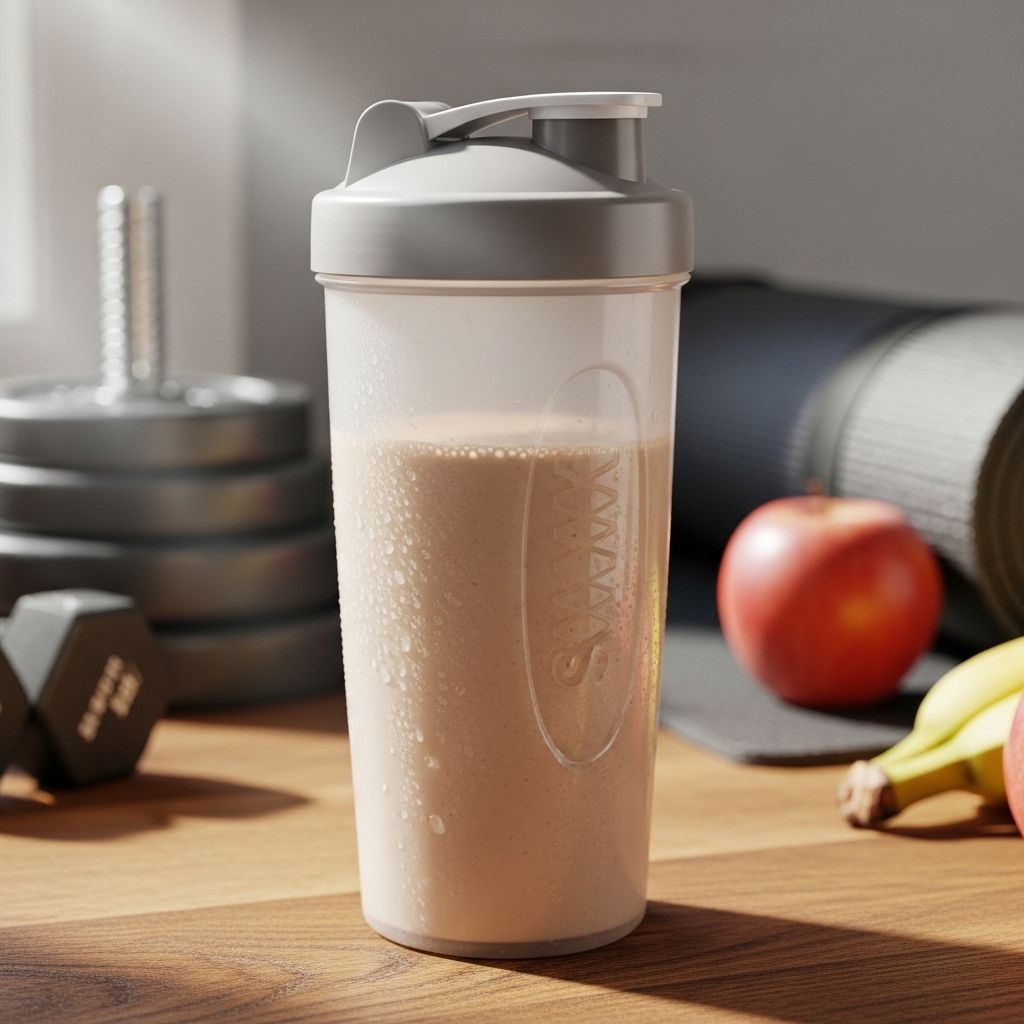How Many Protein Shakes Should You Really Drink Per Day?
Understanding safe protein shake consumption: recommendations, benefits, risks, and how needs differ by activity level, age, and dietary choice.

Protein shakes have become a mainstay in the lives of athletes, fitness enthusiasts, and many seeking dietary convenience. But the question remains: how many protein shakes should you actually drink per day? The answer depends greatly on individual needs, dietary habits, and overall health goals. In this comprehensive guide, we break down expert recommendations, protein requirements, the pros and cons of shakes, and intelligent ways to personalize your approach.
Understanding Your Daily Protein Requirement
Protein is a vital macronutrient: it supports muscle growth, cellular function, satiety, and overall health. However, the amount required daily depends on multiple variables—age, activity level, body weight, and specific health objectives.
General Guidelines
- Recommended Dietary Allowance (RDA): 0.8 grams of protein per kilogram of body weight for sedentary adults.
- Active Individuals: Up to 2.0 grams per kilogram of body weight (for athletes and those building muscle).
- Older Adults: Minimum of 1.0–1.2 grams per kilogram of body weight may be beneficial.
For those who prefer measurements in pounds, this equates to 0.36 grams per pound of body weight for the general population, and 0.6 to 0.8 grams per pound for those seeking muscle growth or engaged in high activity levels.
| Category | Recommended Protein Intake |
|---|---|
| Sedentary Adult | 0.8 g/kg (0.36 g/lb) |
| Active Adult / Athlete | 1.0–2.0 g/kg (0.6–0.9 g/lb) |
| Older Adult | 1.0–1.2 g/kg |
Why People Drink Protein Shakes
Before determining the right number of shakes, it is useful to know the major motivations behind their use:
- Building and maintaining muscle mass
- Post-workout recovery
- Convenient meal replacement
- Meeting daily protein needs
- Weight loss or satiety
Despite their popularity, most nutrition experts agree that whole food should be your primary protein source. Shakes, while convenient, should function as a supplement—not a substitute—for a varied, nutrient-rich diet.
How Many Protein Shakes Should You Drink Per Day?
Experts widely advise one to two protein shakes per day for most people. A third shake may be considered for those with exceptional protein requirements, such as competitive athletes or bodybuilders, but even then, shakes should not replace real meals.
Choosing the right number involves listening to your body, considering your protein intake from whole foods, and your nutrition goals:
- 1 shake per day: Suitable for most individuals eating a balanced diet and looking for supplemental protein after workouts.
- 2 shakes per day: Appropriate for highly active people, athletes, or those who struggle to reach protein requirements through food alone.
- Maximum (3 shakes per day): Reserved for people with elevated needs, such as bodybuilders, but even then, only if high-quality food-based protein sources are insufficient.
Protein shakes are not essential for everyone. “Most people don’t require protein shakes. Whole food should be your go-to for protein.” Using one—perhaps two—shakes may complement your nutritional intake when necessary.
Key Takeaways: Protein Shakes and Whole Foods
- Prioritize whole foods: They deliver essential nutrients alongside protein (like vitamins, minerals, fiber, and healthy fats) which shakes often lack.
- Use shakes for convenience: When meals are not feasible, or when rapid recovery is needed post-exercise.
- Read labels carefully: Not all shakes are equally healthy—look for minimal added sugars, appropriate protein types, and allergy-friendly options.
Navigating Protein Shake Choices
The market offers a wide variety of protein shakes. Choosing wisely can make a difference in health outcomes. Here’s what to look for:
- Protein type: Whey and casein (from milk), egg, or plant-based proteins like soy, pea, and hemp.
- Dietary needs: Vegans should choose plant-based proteins. Those with lactose intolerance may do best with plant options or collagen.
- Label check: Avoid shakes with high added sugar, excessive artificial additives, and prioritize minimal, real-food ingredient profiles.
| Protein Type | Best For | Notes |
|---|---|---|
| Whey | Vegetarians, muscle gain, recovery | Not suitable for vegans or those with lactose intolerance |
| Casein | Slow-release protein, overnight recovery | Similar considerations to whey |
| Plant-based (pea, soy, hemp) | Vegans, lactose intolerance, allergies | Allergen-friendly, slower absorption for some |
| Egg | Paleo diets, muscle building | Non-plant, dairy-free |
| Collagen | Joint/skin health, some protein contribution | Not a complete protein for muscle synthesis |
Potential Risks of Relying on Protein Shakes
- Missing essential nutrients: Shakes do not replace the diverse micronutrients offered by whole food meals.
- Hidden sugars & additives: Some commercial shakes contain high levels of sugar or artificial ingredients, which can contribute to inflammation and other health risks.
- Digestive discomfort: Some experience bloating, gas, or intolerance, particularly with certain protein types or additives.
- Long-term safety: Excessive reliance on supplements may have unknown risks, especially when not supervised by a health professional.
Signs You Might Need More (or Fewer) Protein Shakes
- Active lifestyle/high training volume: If whole foods aren’t meeting your protein needs and you have increased recovery requirements, consider supplementing with shakes.
- Time constraints/convenient nutrition: Busy schedules may occasionally demand a shake, but don’t let them displace regular meals.
- Diverse diet: If your meal pattern already covers protein needs, additional shakes may be unnecessary.
- Medical conditions: Conditions impacting appetite or increased protein requirements may warrant supplementation—but always with a dietitian’s guidance.
Tips for Smart Protein Shake Use
- Consult a professional: For personalized nutrition guidance, speak with an R.D.N. or qualified doctor.
- Vary protein sources: Rotate shake types and prioritize whole food intake (dairy, legumes, lean meats, nuts, etc.).
- Monitor your body’s signals: Fatigue, poor recovery, or poor satiety may indicate a need for adjustment—listen and adapt.
- Read the ingredients: Look for minimal sugar, real food ingredients, and allergy-friendly blends.
How to Calculate Your Protein Needs
To determine your total protein requirement, use one of these formulas:
- For sedentary adults: Body weight (kg) × 0.8 grams
- For active individuals: Body weight (kg) × 1.2-2.0 grams
Example: For a 150 lb (68 kg) adult with moderate activity:
- 68 kg × 1.2 = 82 grams protein/day
The bulk of this protein should come from whole foods; shakes can bridge the gap as needed.
Frequently Asked Questions (FAQs)
Q: Is it safe to drink protein shakes every day?
A: Yes, one to two shakes per day is generally considered safe for most people, provided overall protein intake isn’t excessive and the shakes do not replace nutrient-rich meals.
Q: Should children or teenagers drink protein shakes?
A: Most young people meet protein needs with balanced diets. Shakes may be used if advised for medical or activity reasons, but only under professional supervision.
Q: Which is better: animal or plant-based protein shakes?
A: Both can be effective; the choice depends on dietary restrictions, allergies, and personal goals. Plant-based proteins suit vegans, vegetarians, and those with lactose intolerance.
Q: Are protein shakes good for weight loss?
A: Protein can enhance satiety, which may help manage appetite and support weight loss when paired with calorie control. Shakes should not be used to replace meals entirely.
Q: What ingredients should I avoid in protein shakes?
A: Avoid excessive added sugar, artificial sweeteners, high fructose corn syrup, and unnecessary chemical additives. Seek out simple, whole food–based formulas instead.
Q: Can you consume too much protein from shakes?
A: Yes. Overconsumption may strain the kidneys and displace vital nutrients found in whole foods. Most recommendations cap supplementation at one to two shakes daily unless directed by a health professional.
Takeaway: Balancing Safety and Effectiveness
The decision of how many protein shakes you should drink per day depends on your lifestyle, goals, and dietary pattern. For most, one shake daily is plenty—two may offer support for high training regimens or unique dietary needs. Whole foods, diverse protein sources, and smart supplement choices form the foundation of healthy nutrition. If in doubt, seek the counsel of a registered dietitian to tailor protein intake precisely to your body and objectives.
References
- https://nativepath.com/blogs/supplements/how-many-protein-shakes-per-day
- https://www.prevention.com/food-nutrition/healthy-eating/a63025603/how-many-protein-shakes-a-day/
- https://www.unitypoint.org/news-and-articles/how-much-protein-do-you-need-daily-ideal-protein-intake-for-muscle-growth-weight-loss-and-managing-chronic-conditions
- https://www.health.harvard.edu/staying-healthy/the-hidden-dangers-of-protein-powders
- https://www.prevention.com/food-nutrition/a63749873/guide-to-eating-protein/
- https://pmc.ncbi.nlm.nih.gov/articles/PMC10761008/
- https://www.mayoclinic.org/healthy-lifestyle/weight-loss/expert-answers/protein-shakes/faq-20058335
Read full bio of medha deb












